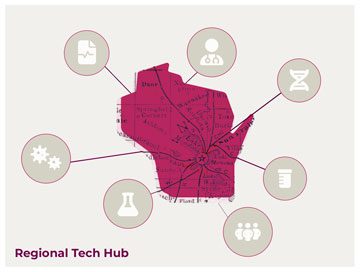 Strategic partners in Wisconsin’s eminent biohealth sector have joined forces to win federal economic development funding by advocating for state designation as a Regional Tech Hub.
Strategic partners in Wisconsin’s eminent biohealth sector have joined forces to win federal economic development funding by advocating for state designation as a Regional Tech Hub.
The designation would enhance current industry and economic development initiatives, reinforce Wisconsin’s leadership in the sector, and heighten the state’s appeal as a place to locate and grow biohealth businesses.
Working collaboratively, 15 public and private entities have created a consortium that aims to bolster Wisconsin’s leadership in biohealth and personalized medicine and to increase opportunities for cooperation and innovation among key stakeholders.
The group includes educational institutions, biohealth companies, precision manufacturers, economic development agencies, and investors. It plans to use its influence to gain Regional Tech Hub designation, which could enable the state to tap $50 million to $75 million in federal funding under the CHIPS and Science Act of 2022.
“Wisconsin is now at the forefront of one of the most dramatic advances we’re seeing in medical care—personalized medicine,” said Missy Hughes, WEDC’s secretary and CEO. “We owe it to the people of the state—and the world—to continue to build on that momentum.”
Consortium members believe that gaining the designation would enable stakeholders to scale up operations to a global level by providing shared data and systems to fuel innovation. It could also improve capital access to start and grow businesses and help boost the supply chain and the manufacturing sector.
In addition, designation as a Regional Tech Hub from the U.S. Economic Development Administration would help coordinate technology development to advance new clinical care pathways, such as new ways to treat specific cancers.
“Exact Sciences looks forward to continuing to work with Wisconsin partners to bring medical breakthroughs to patients and providers,” said Kevin Conroy, CEO of the Madison-based provider of cancer screening and diagnostic tests, which is a consortium member.
The consortium also includes the University of Wisconsin-Madison, a globally respected research institution.
“It’s the epitome of the Wisconsin Idea: working in partnership to drive forward innovation, world-class research, and broad-ranging opportunity for the public good,” said UW-Madison Chancellor Jennifer L. Mnookin.
The economic impact of Wisconsin’s biohealth sector is currently estimated at $28.8 billion.
The state is home to more than 1,700 biohealth companies—spanning medical devices and diagnostics, biotechnology and pharmaceuticals, digital health and health research institutes—employing more than 46,000 people.
Wisconsin Governor Tony Evers said the consortium was made possible because of the strength of existing public and private partnerships; U.S. Sen. Tammy Baldwin is among the supporters of the Regional Tech Hub legislation and Wisconsin’s application.
“Bringing a Regional Tech Hub to Wisconsin will bolster our state as a growth center in this cutting-edge industry, accelerating advances in health care, spurring economic growth in our communities, and creating good-paying jobs in the process,” Baldwin said.
